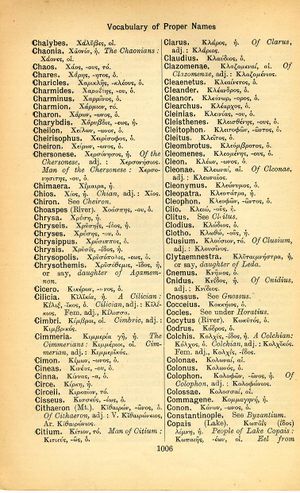Cineas: Difference between revisions
Θεὸς συνεργὸς πάντα ποιεῖ ῥᾳδίως → Rem facile quamvis peragit adiutor deus → Wirkt Gott als unser Partner, macht er alles leicht
m (Text replacement - "link={{" to "link={{") |
m (Text replacement - "}}]]" to "}}]]") |
||
| Line 1: | Line 1: | ||
{{WoodhouseENELnames | {{WoodhouseENELnames | ||
|Text=[[File:woodhouse_1006.jpg|thumb | |Text=[[File:woodhouse_1006.jpg|thumb | ||
|link={{filepath:woodhouse_1006.jpg | |link={{filepath:woodhouse_1006.jpg}}]]Κινέας, -ου, ὁ. | ||
}} | }} | ||
{{Lewis | {{Lewis | ||
Revision as of 10:09, 15 August 2017
English > Greek (Woodhouse)
Κινέας, -ου, ὁ.
Latin > English (Lewis & Short)
Cīnĕas: ae, m., = Κινέας,
I the friend of king Pyrrhus of Epirus, who counselled him to make peace with the Romans, he is said to have had a remarkably retentive memory, Cic. Tusc. 1, 24, 59; id. Sen. 13, 43; id. Fam 9, 25, 1; Plin. 7, 24, 24, § 88; 14, 1, 3, § 12; Sen. Contr 1, prooem. p. 65 Bip.
Latin > French (Gaffiot 2016)
Cīnĕās,¹⁶ æ, m. (Κινέας), ambassadeur de Pyrrhus : Cic. Tusc. 1, 59.
Latin > German (Georges)
Cīneās, ae, m. (Κίνέας), ein Thessalier, Freund u. Diener des Pyrrhus, Königs von Epirus, Anhänger der epikurëischen Philosophie, Nachahmer des Demosthenes in der Beredsamkeit, auch Schriftsteller über das Kriegswesen, Cic. Tusc. 1, 59; ep. 9, 25, 1.

